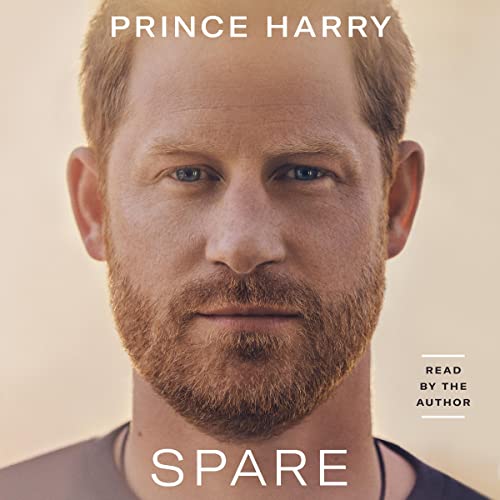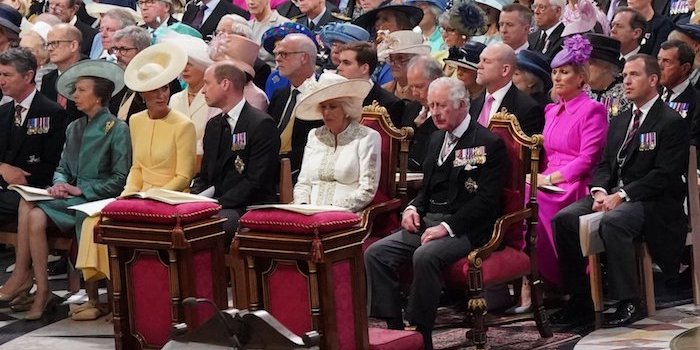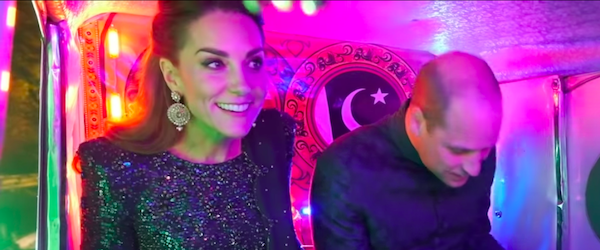I wasn’t planning to read Prince Harry’s new memoir, Spare, but the leaks and press narrative surrounding the book prior to launch compelled me to pick it up so that I could judge the book in context and give Harry a fair shot at telling his story. I went into this book with an open mind, ready to see Harry put his thoughts in context, and came out hating this book with a passion. The writing itself left a lot to be desired as the narrative is not cohesive and lacks purpose; Harry himself admits his own faulty memory which leads to many factual errors throughout the book; and overall Harry showed an astounding lack of empathy or self-awareness.
The writing in Spare is so bad that it highlights the lack of direction or purpose for the narrative as a whole. The book is written so that each chapter is a short vignette of a moment in Harry’s life (there are 234 chapters and 410 pages; a good number of chapters are a page or less) which leaves the reader unable to settle into the narrative since it’s constantly jumping from moment to moment. None of these stories are flushed out to provide the reader with the full context for the story itself or to provide reason for its inclusion in the overall narrative (for someone who wanted to put his context out there, he left a lot of context out of these stories). Perhaps because there isn’t an overall narrative. There is a theme in many of the vignettes of the press being intrusive and a detriment to Harry’s and others’ lives, but overall there is nothing fully tying everything together in a compelling way.
Given the choppy nature of the narrative, I found it difficult to get into the book, but the ultimate slog was the ~150 pages in the middle where Harry recounts his time in the military. No offense intended to anyone who loves military memoirs or military stories, but that’s not me. I could not care any less about anecdotes of Harry’s military training. Harry spoke to Stephen Colbert saying that he included his accounts here to help veterans [Deadline], which tells me Harry’s narrative in this book is undefined. Harry’s theme and narrative, as best I could grasp it, is the press are bad and his family doesn’t understand him. Then apparently there’s a whole other narrative included which Harry is hoping helps veterans. One which honestly I don’t care about – I came for the royal tea, not military tea (again, no offense intended, but I’m sorry, I just don’t care – and give this is my review of my time reading this book, I get to feel that way).
Related to Harry not understanding his audience, whenever he described people he used names that only he (or his inner circle) would know. He never described how anyone looked or provided enough information for me, at least, to figure out whom he was referencing. I went so long having no idea who “Henners” was until Harry stated he died in a car crash and had two brothers named Thomas and Charlie. Then I knew he was discussing Henry van Straubenzee (maybe everyone else picked up on who this was and it’s just me not getting it, but I didn’t get it). I, personally, would rather Harry name names if he’s going to make the claims he made, especially against the press, but at least go Full Taylor Swift and provide enough information for the reader to guess the Blind Item. If even an avid royal watcher was struggling in parts, I can guarantee my real life friends who are not knee deep in this mess will have no idea whom Harry is referencing outside of his family members.
Harry set this book up for failure in chapter 2 when he stated that his memory is faulty and he cannot remember dialogue or dates well. But that’s all okay, reader, because objective facts don’t exist and Harry’s faulty memory is just as true as objective facts, which don’t exist.
Harry said: “Whatever the cause, my memory is my memory, it does what it does, gathers and curates as it sees fit, and there’s just as much truth in what I remember and how I remember it as there is in so-called objective facts.” [Spare, part 1, chapter 2, page 13 of the Kindle edition]
There is a way to justify not remembering every detail perfectly, and that’s to write the narrative in such a way that the exact dates or pieces of dialogue aren’t as important as how those stories affected the author and what they learned and how they grew as a person. Harry didn’t do that. The majority of the stories Harry included don’t provide the reader with an understanding of why they were included nor do they explain how they truly affected the person Harry grew into. In fact, they mostly show a distinct lack of growth and self-awareness.
When Harry is incorrect about basic facts that are easily Googled, it undermines his entire credibility because 1) they are basic facts that are easily Googled and I’m shocked that there’s even a fact checker listed in the acknowledgements because that person clearly did a very bad job; 2) Harry provides no reason not to have these facts be correct. He’s simply recounting stories and stating facts and not providing much narrative on why they matter, so then getting those facts incorrect then does matter a lot. It undermines his entire point because there isn’t a narrative outside of describing these stories.
Take for example the Queen Mother’s death. Harry claims he was at Eton, studying, when he took a call informing him The Queen Mother had died [Spare, part 1, chapter 35, page 74]. Harry was in fact in Switzerland on a ski vacation on March 30, 2002 when the Queen Mother died [photo of Harry with Charles and William on March 29, 2002]. There is no reason to get this detail wrong: it’s easily Googled, it doesn’t change the context because Harry added none to this paragraph except what happened, but I suppose it does change the narrative from “lonely Harry stuck at Eton” to “Harry on vacation with his father and brother”. Perhaps that change in narrative is why Harry (purposefully?) got that fact wrong.
This next item that bothered me greatly throughout the book is a bit of a nitpick on my part. I investigated this after finishing the book and found that memoirs not only are not required to cite their sources but most often don’t. I, however, found the lack of citations throughout Spare incredibly annoying. The reason being in part that I don’t fully trust Harry is stating these claims accurately (due to his factual errors elsewhere) – especially when I can debunk some of his claims surrounding the press later in the book because I was around the royal watching community when those events occurred and know for a fact that he’s incorrect because I covered those events – and because I think if Harry had included citations that would have made his claims stronger. Many times Harry recounted article titles, but if he had actually cited the sources for all of his claims against the press, then it would have provided evidence of his claims. There was one claim where I looked it up and couldn’t find the article to which he was referring.
I was left feeling that Harry showed an astounding lack of empathy or self-awareness throughout the book. Consistently, Harry places blame on others and does not take accountability for his own actions. Take for example the Nazi costume: Harry said that he picked out two costumes, a pilot and a Nazi, and called William and Kate to ask their opinion on which he should wear. William and Kate said Harry should wear the Nazi costume, so he did [Spare, part 1, chapter 50, page 102]. Harry fails to take any accountability for picking out a Nazi costume as a possibility in the first place. He blames it on not thinking.
In discussions of his family, especially with William but also his father, Harry reads negative intent into so many conversations and interactions. He assumes they are intentionally trying to slight him and he never once considers the situation from their point of view or even other alternatives to the negative narrative to which he has jumped. For someone writing a memoir after the fact, someone who claims to have gone to years of therapy, it’s astonishing to me that Harry doesn’t take the time to empathize, to think of alternatives, to step outside of his own myopic views.
I’ve been in therapy for years and it’s been life changing for me. One of the ways it’s helped me is that I can have empathy for people by whom I’ve been hurt, whom I’ve felt so much anger toward. I may not forgive them their sins because they may not deserve it, but I can change how I react so that I can move forward with less anger weighing on my heart. Another thing therapy has helped me with is that not only looking back, but in the moment I can now stop from reading negative intent into every interaction and think positively about my interactions with people. This informs my reactions and ensures I’m staying in a more positive headspace. Harry has shown none of that with this book. Which means I got nothing out of this book, because I’m ahead of Harry in my own personal growth journey.
There were stories Harry told in which I felt genuine sadness and empathy for what he has been through, because even if I don’t fully believe his accounts are entirely accurate I do believe he may have felt this way about those events. It’s difficult growing up having a parent who doesn’t have the same love language as you and cannot provide the emotional support you need. It’s entirely possible that Harry’s family is toxic for him, and that for his own mental health he needs to walk away. I think if that’s the case, though, going on a years-long press campaign to publicly shame his family doesn’t serve his goals because it’s damaging to his own mental health. But that’s me assuming his goal is personal peace, which may not be the case.
Spare broke a world record for the fastest selling non-fiction book of all time [Forbes], so there is clearly a market for this book and I’m sure many people will like it. I found it rage-inducing because it was genuinely difficult for me to read due to the choppiness and lack of direction; I don’t understand the factual errors that were easily disproved and think that hedging your bets by claiming objective facts don’t exist is ridiculous; and I think the lack of accountability for himself, empathy for others, and self-awareness shows that Harry is immature and has a lot of work to do on himself to grow past his royal life and build one of his own making.
Regardless of the royal tea content, looking at the book itself and how it was written, I unfortunately give this 2 out of 5 stars.




